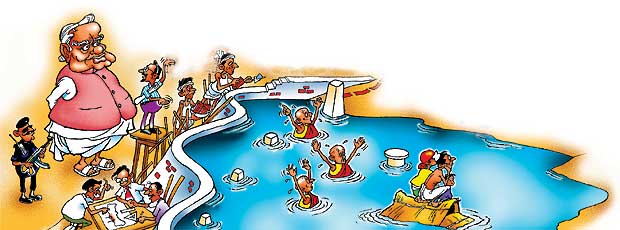
" As a foreigner living here, I don't understand why the Nepali intellectuals, including Bhusal, see foreign interference coming only from the West when the meddling from the South appears to be far more serious and self-interested," a reader lamented last week in Letters (#144).
That perception must have come as news to South Block satraps at Lainchour, but it's one that prevails. We must address it by acknowledging the innate Nepali tendency to compartmentalise our external outlook. Tourism and trade statisticians aren't the only people here who think in terms of India and third countries. There has been a perceptible division of labour in the media along the lines of language. The vernacular press mostly deals with the meddling from the south, while English-language publications tend to take on the West and the rest.
There is a more profound reason for this distinction. The muglan connection is an intrinsic part of our history of isolation. Our contempt for the south's nosiness is bred by familiarity. The disdain is deepened by our obsession with who we don't want to be recognised as. It must have been difficult for our forebears to preserve their independence during the colonialist onslaught in the region. Things acquire a different perspective altogether when we realise who didn't get the railway, bureaucracy and hill stations.
For the uninitiated, there are genuine concerns. If Lesotho, which is surrounded by South Africa, can maintain its identity as a modified constitutional monarchy, why must Nepal, which has one non-Indian flank, succumb to a siege mentality? In the blame game, the political class is castigated for being unduly obsequious to everyone across the vast open frontier. It's useless to go after a fraternity that has thrived on the mediation, arbitration or facilitation from the south ever since the Sugauli Treaty. To understand our political evolution, we must remember that the Koiralas and Adhikarys had to help evict the British colonialists from the region before they could embark on overthrowing the Rana oligarchy back home. It's equally futile to expect the younger leaders to forget ties forged during education and exile.
The panchas didn't have to do too much to gain the south's attention, except veer a little closer to the north when the occasion demanded. They, too, chose to play their cards carefully. Otherwise, our logical response to India's objections to the import of Chinese weapons would have focused on why New Delhi never consulted us before finalising the Bofors deal. We began accusing Rajiv Gandhi's government of imposing a blockade on Nepal when it had left open Jogbani and Raxaul instead of one transit point it could easily have gotten away with. From that precise moment, we knew that internationalisation of the dispute was a non-starter. (The panchas were better at making the most from compromises, though. The Kalapani capitulation of the 1960s led up to Nepal's election to the UN Security Council, a trade-off that strengthened our sovereignty, if you ask me.)
Despite all the political posturing over real and perceived persecution, Nepalis recognise India is a neighbour we must learn to live with. No amount of development dollars or third-country instigation is going to change that. Take the cerebral inquest a step further. What would the dynamics have been today if all our rivers flowed north and the Himalaya fortified our southern frontier?
Regardless of the government of the day in either country, Nepalis are going to continue blaming India for submerging tracts of the tarai each year. Subconsciously, we know we cannot go down the drain because the Indians couldn't afford that. There must be a reason why the Indians declared the Maoists terrorists before we did and continue to do so. If things get out of hand, we can always hope to cross the border with fewer immigration hassles. (Provided we still have the 1950 treaty intact, of course.) The taunts relating to our alpine existence or to the bravery many of us carry as the middle name can be borne with the knowledge that most Nepalis speak better Hindi than former Indian prime minister HD Deve Gowda does.
And speaking of ex-premiers, let's not forget that our own Mohan Sumshere Jung Bahadur Rana and Tulsi Giri opted for post-retirement contemplation in the sanctuary of Bangalore. We haven't ignored the meddling from the south, dear reader. We've put it in a different league precisely because it is far more serious and self-interested.


